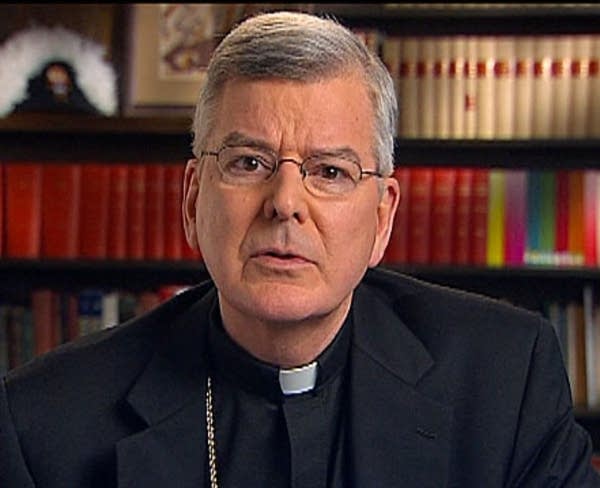Archdiocese: Communion too sacred to be used as protest
Go Deeper.
Create an account or log in to save stories.
Like this?
Thanks for liking this story! We have added it to a list of your favorite stories.

A spokesman for the Twin Cities archdiocese said Tuesday that Catholics should expect to be denied communion if they are wearing rainbow buttons or ribbons at church to support gays and lesbians.
The remarks come 10 days after Twin Cities Archbishop John Nienstedt refused communion to about 20 people wearing rainbow buttons and ribbons at a mass at St. John's Abbey in Collegeville, Minn.
"It's a symbol of the GLBT movement en masse, and it was intended as a protest," said archdiocese spokesman Dennis McGrath. "It was pretty obvious."
McGrath said he learned of the incident from a reporter Monday, and has not yet spoken with Nienstedt or anyone who attended the mass. He declined to arrange an interview with the archbishop, who he said was out of town.
Turn Up Your Support
MPR News helps you turn down the noise and build shared understanding. Turn up your support for this public resource and keep trusted journalism accessible to all.
McGrath said while Catholic doctrine teaches that anybody can seek communion, priests can refuse to provide it under certain circumstances.
"We don't permit communion to be used as a vehicle for protest because it's too sacred," McGrath said, adding that he believes a church is not the appropriate place for a political demonstration. "It ain't the Washington Monument," he said.
Students who attended the mass at St. John's Abbey said many didn't expect to be denied communion for wearing a small rainbow button or ribbon.

"I think that 'protest' is the absolutely wrong word," said Elizabeth Gleich, a student at the College of St. Benedict. "We were there to make a statement, and we did it respectfully and without disruption."
About 25 people, including students, three nuns and one priest, wore a rainbow pin or ribbon to the mass, students said. The group included members of a student group called People Representing the Sexual Minority, or PRiSM.
Students said they had heard about the archbishop's opposition to same-sex marriage, and wanted to show their support for gay and lesbian church members.
PRiSM member Ana Seivert said the group was not particularly noticeable. She said several people ended up in another line, and received communion from another priest who was assisting with the mass.
She said the archbishop gave communion to two or three people, including at least one nun, before realizing that they were wearing rainbow ribbons or pins. Nienstedt refused to give communion to the rest of the group, Seivert said, and instead provided a blessing commonly used for those who are not Catholic.
"We were there to make a statement, and we did it respectfully and without disruption."
"We weren't the ones who made it political," she said. "Once the archbishop denied communion, he made it political."
After the service ended, Father Rene McGraw, a professor at the college, offered a separate mass in a nearby residence hall and gave communion to those who had not received it, students said.
McGrath, the archdiocese spokesman, said Nienstedt would have offered communion to the students if they had removed their rainbow buttons and ribbons.
"Not to be harsh, it's just that it's not permitted," he said. "That's the position."
The students expressed frustration with the archbishop for his refusal to provide communion, and several said they plan to write him a letter to voice their concerns.
"I think all we're asking right now is for him to dialogue with us instead of make these extreme statements, because we really feel like he's not as pastoral as he could be," Gleich said.
Nienstedt has previously denied communion to members of the Rainbow Sash Movement. The group disagrees with the Catholic Church's teachings on homosexuality, and members seek communion while wearing the brightly colored sashes.
McGrath said Tuesday that any churchgoer who wears any symbol with the intention of making a political statement or protest could be denied communion.
However, he said that most priests would not deny communion to Catholics wearing buttons opposing abortion.
"I would hope that someone would say to them, let's try to do it without the buttons," said McGrath. "But pro-life is a fundamental position of our church, so I doubt that very much."
The difference, he said, is that the Catholic Church does not view abortion as a political issue.
Dear reader,
Political debates with family or friends can get heated. But what if there was a way to handle them better?
You can learn how to have civil political conversations with our new e-book!
Download our free e-book, Talking Sense: Have Hard Political Conversations, Better, and learn how to talk without the tension.




